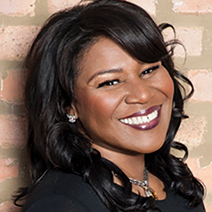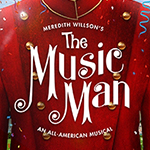Tammy McCann
Mahalia Jazz
Pangea, NYC, January 12, 2018
Reviewed by Alix Cohen for Cabaret Scenes

Photo: Mary Rafferty
Last October, I saw Tammy McCann perform at the Mabel Mercer Foundation’s annual New York Cabaret Convention. She blew me away. On the occasion of one of her too-rare appearances here, a visit to Pangea, one of my favorite Manhattan bôites, was requisite. Having never attended a full show by the artist, I had no idea what to expect.
“If I don’t praise Him, the rocks will/I don’t want no rocks speakin’ for me….” From the back of the room, McCann’s elementally powerful, a cappella voice rises like warm, fresh-baked bread. She makes her way to the stage stilling the room with her stillness.
Mahalia Jazz is a jazz/gospel fusion celebration of vocalist and civil rights activist Mahalia Jackson (1911-1972). Inviting her jazz rhythm section to accompany and collaborate, McCann added different dimension to a touring show I infer was more traditional. She credits bassist Mimi Jones with inspired arrangements, and calls the new take a work in progress. (Its most recent arrangement arrived the night before this show.)
A Chicago native by way of Mississippi, McCann probably cut her teeth on church music. Spirit penetrates. Tonight’s first selection, an original treatment of “Kumbaya,” sets the tone.
Cue Dorothy telling Toto, “We’re not in Kansas anymore.” McCann’s iconoclastic phrasing, irrepressible variation, and innate devotion almost alternate with music which hightails it up a different road entirely.
Highlights:
“Move” is hypnotic, unconditional. Accompanied only by Darrian Douglas’ drums and the patting of Mimi Jones’ low-hugged bass, McCann’s vocal purity radiates. Eyes closed, arms spread, palms up, fingers spread, she gives testimony.
“We’re all in service of Mahalia Jackson’s overarching spirit; the way she makes us feel, the way she makes me feel—as if I got somebody on my side” (McCann). Gestures are minimal, meaningful.
“Elijah Rock” is heady. McCann kneads the name Elijah like clay. One octave nudges another in fluent morphing of shape. Feet quietly tap, heads bob. “Y’all didn’t get the audience participation waiver,” she quips, encouraging us to come in with “Shout, shout…” when directed. (We do.) It’s big, bright, joyful; a clarion call. Anthony Wonsy bends forward with head almost touching the keys. His whole upper body moves here.
With Jones’ arrangement of “How I Got Over,” it’s easy to imagine a robed gospel choir behind the singer, voices angled skyward. Oh, to hear McCann beneath a cantilevered ceiling. The vocalist is expansive, sincere, consequential. Happiness unfurls anew with every lyric. “…Then I’m gonna thank God for ol’ time religion/And I’m gonna thank God for giving me a vision….” The song is the most effective synergy of jazz and spiritual we hear tonight.
When Martin Luther King was down, we’re told, “it wasn’t uncommon for him to pick up the phone and get a little support. This is the song he’d ask to hear…” (Jackson was his soloist). “Precious Lord” emerges straight-up, unhomogenized gospel. McCann and Wonsey are like two musical instruments saluting one another. We can practically see notes course through them. Sound and soul unite.
Two included secular numbers are not of Jackson’s oeuvre—she strictly adhered to religious material. These are “Blue Moon” (Richard Rodgers/Lorenz Hart) “because her favorite color was blue,” and the encore of “On Green Dolphin Street” (Bronisław Kaper/Ned Washington). The former sounds like a tropical island interpretation with darting, pecking, rhythmic percussion and spongy bass atop veldts of piano chord. Mute horn-like scat dances as, infectiously, does McCann. We close with soprano keys evoking wind chimes in languid play. The latter begins über-cool, but, like a few other selections, gets swallowed by conflicting style. “I Want Jesus” is way too long.
Tammy McCann’s energy, elastic timbre, personal phrasing, lyric awareness, and sublime control combine to make a package offering continued appeal. Stage presence is focused and gracious; she connects. I’m curious to hear what the artist comes back with next.





